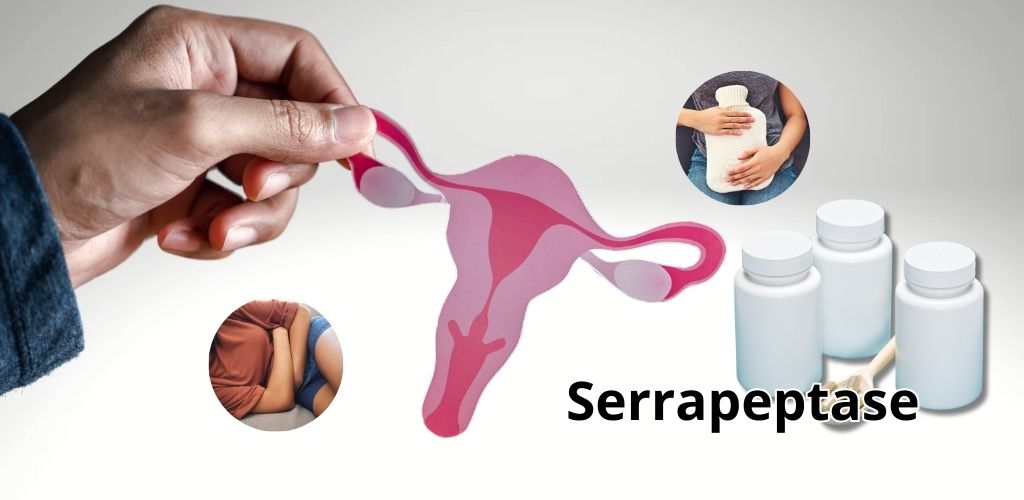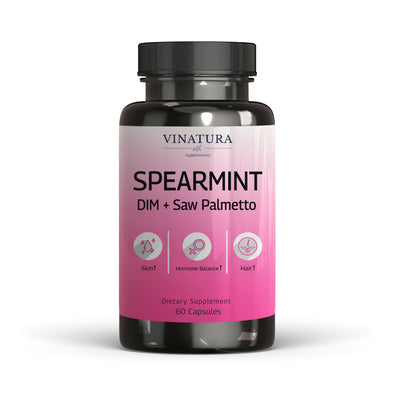
Can Serrapeptase Help With PCOS?
Polycystic Ovary Syndrome (PCOS) is a common endocrine disorder affecting women of reproductive age, characterized by irregular menstrual cycles, ovarian cysts, and hormonal imbalances.
Many women seek natural remedies to manage PCOS symptoms, and serrapeptase has emerged as a popular option. But does serrapeptase really help with PCOS?
This article will help you answer this question.
Before exploring further, please read the disclaimer located at the end of this webpage.
Key Takeaways
- PCOS is a common endocrine disorder in women.
- Symptoms of PCOS: Menstrual irregularities, excessive hair growth, acne, weight gain, and infertility.
- Serrapeptase is an enzyme derived from the bacteria Serratia marcescens, believed to have anti-inflammatory and protein-degrading properties.
- Some claim that using Serrapeptase can alleviate PCOS symptoms, however, more clinical research is needed to establish its efficacy.
- Serrapeptase has mechanisms that are believed to reduce PCOS symptoms.
- Using Serrapeptase requires attention to dosage and duration of use.
- Medical attention should be sought promptly if adverse effects occur when using Serrapeptase.
- In addition to Serrapeptase, there are other ways to manage PCOS.
What is PCOS and Its Symptoms?

Polycystic Ovary Syndrome (PCOS) is one of the most common endocrine disorders in women, affecting 8% to 13% of women of reproductive age [1].
It is a complex condition with causes not fully understood, but believed to be related to genetic and environmental factors [2].
This disorder leads to reduced fertility as well as irregular menstrual cycles and scant menstrual flow.
Specific symptoms of PCOS may include [1], [2], [3]:
- Irregular menstruation: Few, irregular, or prolonged menstrual periods.
- Increased androgens: High levels of male hormones leading to excessive hair growth, acne, and hair thinning or loss, particularly at the crown of the head (similar to male pattern baldness).
- Polycystic ovaries: Ovaries with multiple small cysts that can enlarge the ovaries and result in irregular menstrual cycles.
- Insulin resistance: Weight gain, especially in the abdominal area, Difficulty losing weight.
- Skin issues: Acne, oily skin,...
Read more: What Are the Benefits of Serrapeptase for Fertility?
Can Serrapeptase Help With PCOS?

Serrapeptase is an enzyme capable of breaking down nonliving protein, helping to reduce inflammation and swelling. Many individuals have reported using
Serrapeptase and finding it helpful in improving symptoms of PCOS.
One person named Sara shared that she had endured a lot of pain and discomfort from polycystic ovary syndrome (PCOS) and joint pain for many years. She had tried various treatment methods with no success.
However, when using Serrapeptase, her cysts and pain were effectively controlled as long as she continued using this enzyme [4].
Sara McLaughlin is a specific example of someone who found significant improvement in PCOS symptoms thanks to Serrapeptase.
This indicates that Serrapeptase may have a supportive effect in reducing inflammation and pain associated with PCOS. However, the use of Serrapeptase should be done under the supervision of a healthcare professional.
How Does Serrapeptase Help With PCOS According to Scientific Perspective?
From a scientific perspective, Serrapeptase works by breaking down non-living proteins in the body, helping to reduce inflammation and swelling [5].
For PCOS, inflammation and scar tissue in the ovaries can hinder normal ovarian function and cause discomforting symptoms.
Serrapeptase may help improve ovarian function and alleviate PCOS symptoms by reducing inflammation and eliminating scar tissue.
However, it's important to understand that current information about serrapeptase primarily focuses on its anti-inflammatory properties, immune regulation, and pain reduction. These effects may indirectly support some symptoms of PCOS.
However, there is not enough specific scientific evidence to prove that serrapeptase can directly treat or reduce PCOS symptoms.
Read more: Can Serrapeptase Dissolve Scar Tissue?
How to Use Serrapeptase for PCOS

Firstly, you need to know the dosage when using Serrapeptase for PCOS. The typical dosage of Serrapeptase ranges from 10 mg to 60 mg per day, although this will depend on your specific condition.
Taking Serrapeptase on an empty stomach is best for optimal effectiveness [6].
You can start with a low dosage of Serrapeptase and gradually increase it based on your body's response.
Serrapeptase is available in various forms such as tablets, capsules, softgels, powder, liquid, and combined. You can choose the form that suits your needs and preferences.
Serrapeptase supplements may have become a popular choice for many due to their convenience and benefits.
Serrapeptase supplements may be combined with other ingredients to improve overall health and manage health issues. You may experience additional benefits when using Serrapeptase supplements.
Side Effects You Should Be Aware When Using Serrapeptase for PCOS

Although Serrapeptase is generally considered safe for most people, it can also cause some side effects, including:
- Stomach pain
- Nausea
- Diarrhea
- Allergic reactions
Additionally, while there are currently no reports of specific clinical studies related to drug interactions, you should use caution when taking Serrapeptase along with Warfarin, Clopidogrel, Aspirin, and natural remedies such as garlic, fish oil, and turmeric, as they may increase the risk of bleeding or bruising [6].
If you experience any adverse effects, discontinue use and consult a doctor immediately.
Other Ways to Manage PCOS
In addition to using Serrapeptase, there are several other ways to manage PCOS, including:
- Lifestyle changes: Maintaining a healthy weight, eating a balanced diet, and exercising regularly.
- Using functional foods to treat polycystic ovarian syndrome such as: Inositol, Chromium, Cinnamon, Turmeric, etc.
- Regular gynecological examinations: Regular gynecological examinations help detect signs of the disease early, even when symptoms are not yet evident.
- Increasing regular physical activity will support the treatment of PCOS, prevent insulin resistance, control weight, and prevent diabetes.
- Limiting carbohydrates is essential to reduce insulin levels, avoiding diets high in fat and carbohydrates.
Conclusion
Although serrapeptase shows promise in controlling PCOS symptoms due to its anti-inflammatory properties, scientific evidence of its effectiveness for PCOS is limited.
Additionally, using serrapeptase should be consulted with a healthcare professional to ensure safe and effective PCOS management.
Hopefully, you have found the answer to the question of whether serrapeptase can help with polycystic ovary syndrome (PCOS). Thank you for reading.
Related Article:
- Can Serrapeptase Help with Endometriosis?
- Does Serrapeptase Help With Weight Loss?
- 10 Best Serrapeptase Supplements For Circulation Health
References
- [1] Hoeger KM, Anuja Dokras, Terhi Piltonen. Update on PCOS: Consequences, Challenges, and Guiding Treatment. The Journal of clinical endocrinology and metabolism/Journal of clinical endocrinology & metabolism. 2020;106(3):e1071-e1083. doi:https://doi.org/10.1210/clinem/dgaa839
- [2] Azziz R. PCOS: a diagnostic challenge. Reproductive biomedicine online. 2004;8(6):644-648. doi:https://doi.org/10.1016/s1472-6483(10)61644-6
- [3] Evaluation of androgen-dependent skin findings of polycystic ovary syndrome (PCOS). Gynecological Endocrinology. Published online 2022. doi:https://doi.org/10.1080//09513590.2022.2162496
- [4] By Robert Redfern with Studies and Literature Extracts for Health Professionals. https://www.merlinalchemy.com/wp-content/uploads/2022/09/The-Miracle-Enzyme-Is-Serrapeptase.pdf
- [5] Tiwari M. The role of serratiopeptidase in the resolution of inflammation. Asian journal of pharmaceutical sciences. 2017;12(3):209-215. doi:https://doi.org/10.1016/j.ajps.2017.01.003
- [6] Bhagat S, Agarwal M, Roy V. Serratiopeptidase: A systematic review of the existing evidence. International journal of surgery. 2013;11(3):209-217. doi:https://doi.org/10.1016/j.ijsu.2013.01.010
Author

Product Disclaimer
The dietary supplement products mentioned on this website are formulated based on scientific research and adhere to FDA guidelines for dietary supplements. However, the content of the articles has not been evaluated by the Food and Drug Administration (FDA) and is not intended to promote or endorse any specific product. Any products sold on this website are not intended to diagnose, treat, cure, or prevent any disease.
Opinions and Endorsements
Any claims, statements, or opinions expressed in the articles are those of the author(s) and do not necessarily reflect the views or opinions of the manufacturers of the dietary supplement products. The products sold on this website are separate from the content of the articles and are not directly endorsed or associated with the information presented here.
Liability Disclaimer
The author(s) of the articles, website, and manufacturers of the dietary supplement products do not assume any liability for any potential consequences arising from the use of the information provided in the articles. It is recommended that individuals consult with a qualified healthcare professional before making any dietary or lifestyle changes, including the use of dietary supplements.
Product Usage
Please refer to the product labels and packaging for specific usage instructions and guidelines for the dietary supplement products sold on this website.
Customer Support
For any concerns or questions regarding the dietary supplement products, please contact our customer support team, who will be more than happy to assist you.





Leave a Comment
Be the first to comment.
What do you think?